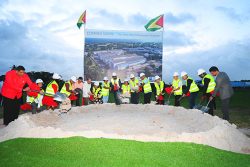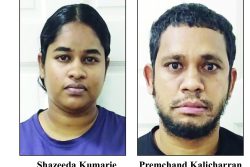The Guyana Country Coordinating Mechanism (CCM) on accessing the Global Fund last month held a consultation on HIV at the Cara Lodge Hotel, Georgetown and heard how there had been progress on reducing infections.
The consultation is usually held to identify gaps and challenges faced by stakeholders, and to formulate recommendations to be made before Round 11, when bidding for money from the fund will be done. In addition, a report on activities and discussions of the Country Coordinating Mechanism (CCM), HIV programme performance and eligibility requirements was also presented at the July 28 consultation.
The representative for Guyana’s CCM HIV programme, Desiree Edghill, delivered a detailed report which dealt with her organization’s activities during the year. She stated that during a special CCM meeting held in August last year, updates from technical authorities on The Global Fund for HIV/AIDS, Tuberculosis and Malaria were given. Further, a regional workshop for CCM was held in Jamaica last September where lessons and experiences gained regarding Global Fund grants and overall combating of HIV were discussed. This is in addition to the bi-annual reports that the HIV Programme gives to the Country Coordinating Mechanism (CCM).
She stated that her organization was proud to report that due to their input, Guyana has moved from being the country with the highest rate of HIV infection in the Caribbean, to sixth. This however does not mean that the organization will reduce the intensity of its efforts.
Edghill further informed that the grants from the Global Fund were also to reduce HIV-associated mortality, increase the lifespan of persons living with HIV, and reduce the sero prevalence, (the number of persons in a population who test positive for a specific disease based on blood serum specimens) in the ante natal and commercial workers population.
Sherwood Clarke, a trade union representative, raised the issue of stigma and discrimination in the workplace, and stated that strategies to deal with workplace discrimination, especially, for those in personnel departments of government offices, need to be implemented. He also opined that insurance companies should also put policies in place that would be of help to persons living with HIV and AIDS.
Developing a strategy to deal with the hinterland, poses its own problems because of geography, terrain and population density, the consultation heard. These regions make educating and treating this section of the population difficult.
However, unlike the TB and malaria programmes which enlisted the help of the community and its leaders, the HIV programme cannot be introduced because of the family-like setting of these locations, where everyone is either related to, or is familiar to everyone. Persons living with HIV/AIDS therefore travel to distant locations to maintain privacy and prevent discrimination. In this way, they are not recognized when they seek counselling and treatment.
UNAIDS country coordinator Dr. Ruben del Prado in giving an overview of the Global Fund and the CCM stated that The Guyana CCM is responsible for making these proposals, as well as ensuring that guidance in planning, and use of funds is provided. Further, the Guyana CCM is tasked with coordinating all aspects of projects in the quest to eradicate TB, malaria and HIV in Guyana; this includes overseeing health systems.
Sarah Insanally, Secretariat Coordinator presented on eligibility requirements of the Global Fund. She noted that monetary contributors to the Global Fund are from governments of developed countries. The worldwide recession therefore has impacted negatively on the amounts each country would normally pledge.








